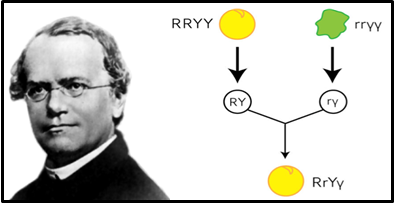
The elegant mathematics of genetics were worked out in the pea garden of a monastery by a curious monk with a scientific mind. Gregor Mendel’s careful experimentation introduced the concepts of discrete hereditary units, dominant versus recessive traits, segregation and independent assortment to the world. On this 150th Anniversary of the presentation of his results, we praise the ingenuity of Gregor Mendel and the knowledge he left behind.
Mendel’s Laws of Inheritance
Using the garden as a genetics laboratory, Gregor Mendel could manipulate and select for certain traits to formulate and test out his hypotheses about mechanisms of inheritance and distribution of traits in offspring. He observed that the shape of a pea seed was a characteristic that was passed on to progeny independently from other characteristics, such as plant height or flower color. Seven years and over 29,000 pea plants later, Mendel was able to describe his Law of Dominance, Law of Segregation and Law of Independent Assortment, which are the basis of Mendelian genetics. Remarkably, Mendel described elements of DNA-based inheritance in the absence of any knowledge of the molecular biology behind it.
Presenting the findings and their impact
The paper summarizing Mendel’s many years of work, entitled Versuche über Pflanzen-hybriden (Experiments in Plant Hybridization), was finally presented at the February 8 and March 8 meetings of the Natural History Society of Brno in 1865. Although initially well-received, Mendel’s work garnered little attention, even after it was published in 1866. In fact, over the next 35 years, this paper was only cited three times!
Although Mendel wasn’t given proper appreciation during his lifetime, subsequent to his death the scientific community came to understand and utilize his insightful discoveries. The field of genetics took off at the turn of the 20th century and at least three different research groups independently re-discovered Mendel’s Laws, proving not only the validity of these tenets but also their usefulness to the field. They served as a basis for a new biological discipline, the science of inheritance.
Over the years Mendel’s work has been a source of controversy, with claims that his experimental data are “too perfect”. These objections are now largely dismissed and and in no way diminish the central truths of Mendel’s laws. His hypotheses have been confirmed again and again and have even been unified with cellular and molecular models of inheritance, as well.
Legacy
At various times, Gregor Mendel has been honored, dismissed, “re-discovered” and doubted, but his important contributions to the field of genetics continue to influence modern scientists and every geneticist or student of genetics has heard his name. From plant breeding to genetic counseling, the impact of the discoveries of this “Father of Modern Genetics” has been felt by us all in some way or another and will continue to do so, for the next 150 years and beyond.
let us celebrate bicentenary of 150 years of Mendelian Genetics…………….prof premraj pushpakaran